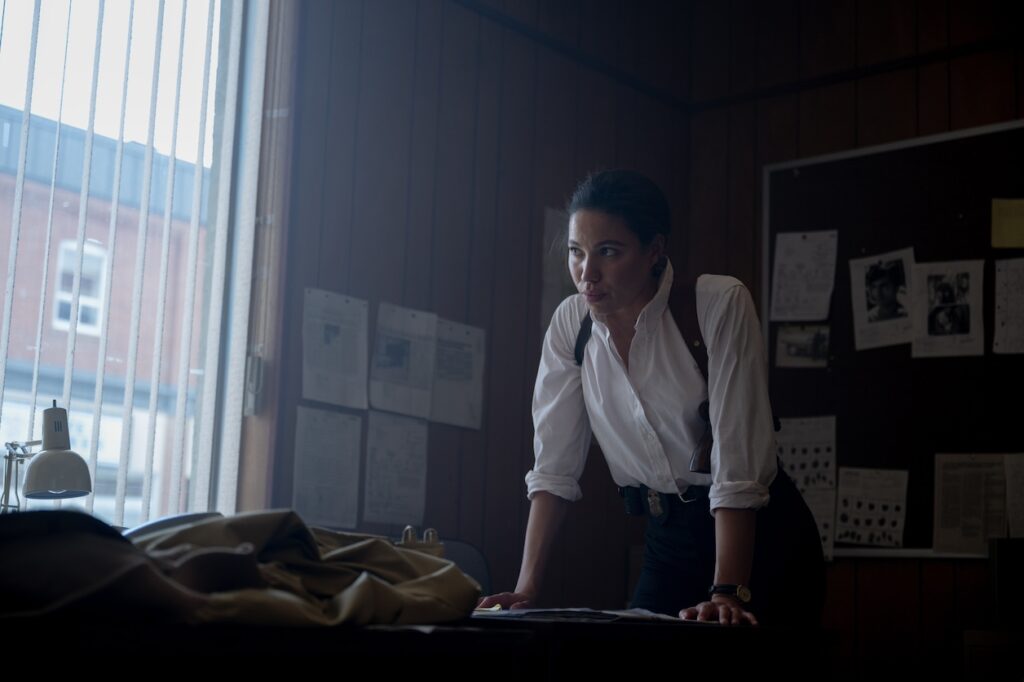Led by Jude Law, ‘The Order’ May Have Worked Even Better as a Limited Series Than a Feature Film
The characters deserve more emphasis. The backstories powering Law’s straggly lawman, Tye Sheridan’s go-get-’em novice, and, especially, Nicholas Hoult’s charismatic terrorist would barely fill a bumper sticker.

Is it me, or does the typical limited series suffer from not being sufficiently limited? These programs, whether seen on television or via streaming, drag on for reasons that seem to have less to do with narrative fullness than with satisfying a contractual obligation. Wander, they do, being neither fish (a movie whose formatting involves a compression of time and story) nor fowl (an episodic series predicated less on plot than on character).
For every exception — “Tehran” (2020-), say, or “The Night Of” (2016) — there are a baker’s dozen of overextended rules, like the rambling Kate Winslet vehicle “Mare of Easttown” (2021) or the insufferably obtuse “True Detective” (2014-).
Why, then, did I find myself wishing that Justin Kurzel’s feature film, “The Order,” had been made into a limited series? One might think Mr. Kurzel’s narrative would make a good picture, being a variation on good guys and bad guys. The protagonists, who are not without their flaws, are out to get the antagonists, and though Mr. Kurzel’s picture doesn’t necessarily culminate on a happy note, there is a sense of resolution as the story draws to a close. There’s a chase or two, some shoot-outs, broken hearts — you know, the usual.
“The Order” is based on a true story, the facts of which readers may recall, among them the 1984 assassination of a Denver radio talk show host, Alan Berg. The vociferous Berg, whose confrontational style lit up the call lines, raised the ire of neo-nazi types, including a lapsed Mormon who transformed himself into a proponent of white suprematism, Robert J. Mathews. That the Jewish Berg should use the airwaves to question the veracity of “The Protocols of the Elders of Zion” didn’t sit right with Mathews and his cronies.

Producer Bryan Haas and screenwriter Zach Baylin secured the rights to a book about this particular outpost of America’s underbelly, “The Silent Brotherhood” (1990) by Kevin Flynn and Gary Gerhardt. It would, they imagined, make for a “gripping thriller.” The title of their movie is a direct reference to the splinter group Mathews established in his frustration with the skewed variant of Christianity proffered by the Aryan Nations. “Bob” found that organization wanting in radicalism. Violence was fair game for the far-reaching ambitions of The Order.
Mathews’s group took inspiration from a novel, “The Turner Diaries,” by a Holocaust denier and white supremacist, William Luther Price. His under-the-table fantasy imagined a complete and total overthrow of the U.S. government and a subsequent extermination of African Americans, Jews, and other “liberal actors.” The book is seen several times during the run of “The Order,” as are fliers for a group advocating for “White Power.” FBI agent Terry Husk (Jude Law) doesn’t take kindly to these artifacts.
We meet Husk as he drives into Coeur D’Alene, a sleepy Idaho backwater. The local authorities are flummoxed by his arrival; suspicious, too. When Husk starts asking the cops on the beat about the Aryan Nations and its leader, Richard Butler, the local sheriff bristles. But not so a young and, one guesses, newish officer, Jamie Bowen (Tye Sheridan). Interrupting the conversation, Bowen notes that the group’s compound is only 20 miles down the road. Husk recognizes an ally when he sees one. Bowen’s boss tells him to get back to work.
Husk, Bowen, and, later in their travels, fellow FBI agent Joanne Carney (Jurnee Smollett) team up to investigate a recent spate of bank robberies and bombings. Among the suspects is a fictionalized version of Bob Mathews (Nicholas Hoult in a cocksure performance). The scene in which Husk and Mathews initially meet after an anticlimactic turn at deer hunting is remarkably tense, particularly as the two men don’t yet know each other’s identities. Messrs. Law and Hoult navigate the moment with notable deftness.
Alas, this wary strain of friction isn’t elaborated upon or maintained. Messrs. Kurzel and Baylin settle for a by-the-book groove, streamlining a true-crime story to conventional ends. This is why “The Order” would benefit from the extended run-time of a limited series: The characters deserve more emphasis. The backstories powering Mr. Law’s straggly lawman, Mr. Sheridan’s go-get-’em novice, and, especially, Mr. Hoult’s charismatic terrorist would barely fill a bumper sticker. If you want to grip and thrill, make sure your characters are more than watercolor sketches.
All of which is frustrating because the actors are outstanding. Pity Ms. Smollett, who does what she can with her role as a tough broad who’s seen it all. But Mr. Law? Rarely has he been this distinctive, rangy, or rugged. His grizzled take on Husk has none of the ostentatiousness typical of Hollywood stars who attempt to embody the grittier precincts of life. Mr. Law is hardly recognizable and sustains the fiction with a gratifyingly lived-in naturalism. One wonders if Agent Husk has more adventures under his belt: They’d make for a great limited series.

